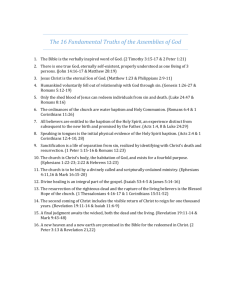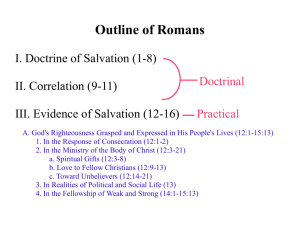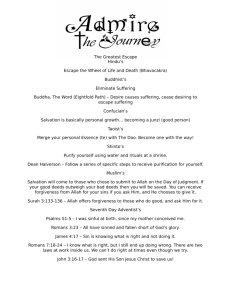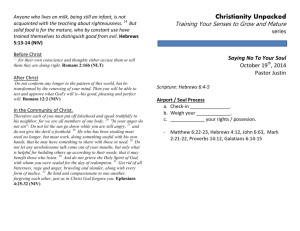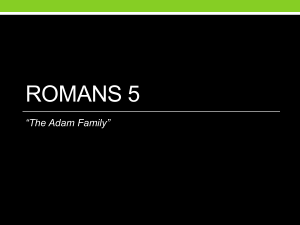Global Interpretation of Christian Scriptures
advertisement
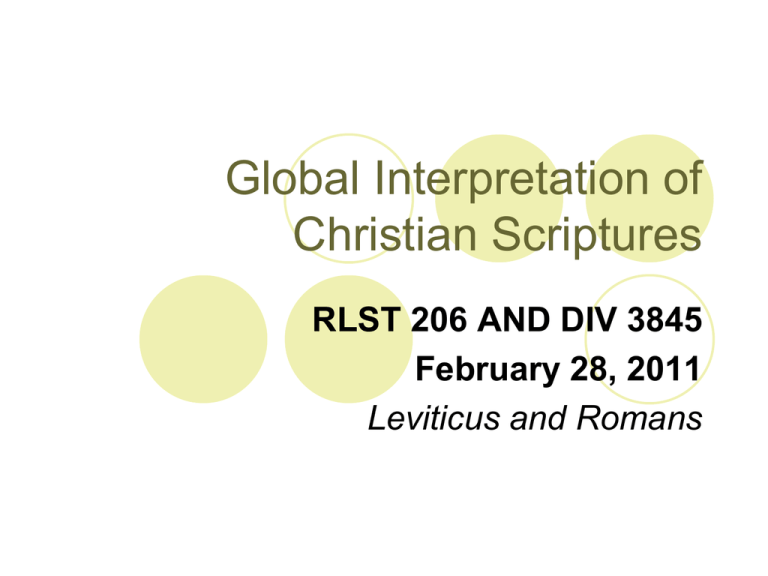
Global Interpretation of Christian Scriptures RLST 206 AND DIV 3845 February 28, 2011 Leviticus and Romans Today a) 3:10 Context for Interpreting Leviticus and Romans b) 4:00 Group Discussion (comparing multiple readings with yours): Leviticus Romans c) 5:00 Strategies for developing your paper Signing up for the rest of the semester Adelekun, Adesewa Galatians Aluoch, Wendy Joel, Ankrom, Iris Ruth, Calderwood, Matthew Revelation, Dillon, Chance Matthew, Higgins, Erin Job, Holland-Shuey, Bayse Genesis, Keith, Anna Leigh Corinthians, McReynolds, Anna Hosea, Pflederer, Ben Ecclesiastes Schomp, Taylor James, Scott, Lakendra Daniel, Wells, Mark Haggai, Williams, Arlonzo, Acts Wong, Annie Psalms Today… Knowing that you focus your attention on other things…your Proposals Let me take the time to present to you the GBC readings on Leviticus and Romans Questions raised in discussion about 1-2 Samuel -- 1 Concerning both the oppressive and liberative usage of the Bible, some tried to make a distinction between the Bible and the interpretations of the Bible. The Bible is not oppressive; certain interpretations are oppressive The Bible is not concerned with social, economic, cultural liberations (only certain interpretations are) I agree: this is true. The Bible is neither oppressive nor liberative; neither concerned with spiritual salvation nor concerned with social and political issues … ALL OF THESE ARE INTERPRETATIONS = interpretive choices. The Bible makes (positive or negative) sense only when it is read as Scripture! Word to live by = related to life. But, is it not clear that the Bible does have oppressive passages? No. This is not clear. Passages that we (in a certain context) see as oppressive, where not perceived as oppressive in other contexts. Questions raised in discussion about 1-2 Samuel (2: Mission) Then what if the missionaries’ “oppression" (as expressed by Africans in West’s commentary) was genuinely deemed "good“ by the missionaries? They did what they did because they thought that by doing so they were saving "souls"? The question is: what is “mission” all about? What is the problem it seeks to address? It depends on how the missionaries interpret the Scriptures. What is the teaching on Mission in Romans (Rom 15:14-24)? (1) Paul’s mission is a model for the missionaries’ activity. Emulating Paul’s model, they need to preach the gospel message (15:19-20 read together with e.g., 1:15, 10:8, 10:14-15) to people who do not know it so that they might believe and be saved (from eternal condemnation, 6:22) by being justified by faith (e.g. 5:9-10 and 10:1-17). Problem = human sinfulness; humans are under God’s condemnation (God is angry; or God’s honor has been transgressed and need to be repaired). Root Problem: NOT KNOWING (not believing = not having the right knowledge] about Christ’s death for us Solution: putting oneself in the benefit of Christ’s death by believing = justification by faith >>> eternal life with God. LAMP TO MY FEET, RULE OF THE COMMUNITY, GOOD NEWS What is the teaching on Mission in Romans (Rom 15:14-24)? (2) BOOK OF THE COVENANT/FAMILY ALBUM Model: The missionary activity of the churches Paul describes. Paul plants small communities, then moves on (Spain, 15:23-28), but the mission continues: these communities (the body of Christ, 12:4-5) are missionary centers called to carry out in their Gentile contexts a special mission – bringing the Gentiles to glorify God, 15:7-12 – just as Christ did among the circumcised (15:8), and as Israel was and remains called by God to do as the People of God (11:28-29). As Paul is, Gentile Christians are “called” or “chosen” (Rom 1:6) to be “saints,” i.e., set apart from the world for a twofold mission, a priestly service: collectively glorifying God in worship services (15:6); and bringing others to glorify God, by words and deeds, through their ways of life in which they offer themselves as living sacrifice (12:2; 15:18-19). What is the teaching on Mission in Romans (Rom 15:14-24)? (2b) BOOK OF THE COVENANT/FAMILY ALBUM Model: The missionary activity of the churches Paul describes. these communities (the body of Christ, 12:4-5) are missionary centers called to carry out in their Gentile contexts a special mission – bringing the Gentiles to glorify God, As Paul is, Gentile Christians are “called” or “chosen” (Rom 1:6) to be “saints,” i.e., set apart from the world for a twofold mission, a priestly service: collectively glorifying God in worship services (15:6); and bringing others to glorify God, by words and deeds, through their ways of life in which they offer themselves as living sacrifice (12:2; 15:18-19). Problem = People fail to glorify God; People are angry with God, distrust God… Root Problem: Not recognizing (seeing) oneself as beloved by God; as the beloved people of God. Solution: being invited to share in thanksgiving services with believers; being beneficiaries of good deeds done in the name of God (great growth of the church during plagues in 2nd -3rd cent: Christians taking care of the sick and hospitality toward the poor) What is the teaching on Mission in Romans (Rom 15:14-24)? (3) CORRECTIVE GLASSES; EMPOWERING WORD Model: What happens during Paul’s and the churches’ missionary activity. Romans 15:17-19 I have reason to boast in Christ Jesus for the things pertaining to God (= for what God accomplished in my ministry). 18 For I will not venture to speak of anything except what Christ has accomplished through me to win obedience from the Gentiles, by word and deed, 19 by the power of signs and wonders, by the power of the Spirit of God, so that from Jerusalem and as far around as Illyricum I have fully manifested the good news of Christ. MISSION = pointing to the manifestations of THE POWER OF GOD = of God’s (and the Spirit’s) interventions that free people from the power of evil and the power of sin. What is the teaching on Mission in Romans (Rom 15:14-24)? (3b) CORRECTIVE GLASSES; EMPOWERING WORD Model: What happens during Paul’s and the churches’ missionary activity. Romans 15:17-19 Mission = pointing to the manifestations of THE POWER OF GOD = God’s interventions that free people from the power of evil and the power of sin. Problem: People are under powers of evil (like a disease; or demonic possession; or systemic evil); Root Problem: Powerlessness or lacking the vision that God is already powerfully at work in the present Solution: Manifestation of God’s liberating power. Missionaries do not do a thing themselves; they are simply conduit for God’s liberating manifestations. Racism; Anti-Semitism; Anti-Judaism Root Problem: Lack of knowledge (of other people)? Lack of/wrong Will (I care only about myself)? A systemic evil that I am powerless to overcome? A wrong ideology? A wrong faith (idolatry; making of oneself and one’s group an absolute) In all cases, racism or Anti-Semitism can be conveyed by the interpretations of Scriptures STRATEGY to become aware of our choices: How does this interpretation affect other people? The Holocaust as an effect of reading the Bible by Christians? Anti-Semitism = racist view = against the “Semitic race” Root: Anti-Judaism = against the Jewish Religion (rejection of) Root: Supersessionism = Judaism is superseded by Christianity; Christianity supersedes or replaces Judaism*, New Covenant supersedes the Old Covenant Jesus “fulfills” the Law and the Prophets… understood as replaces the Law and the Prophets = abolishes the Law Christ is the complete and final revelation that not only fulfilled but ended the purpose of the law*, Jews are evil, hypocrites, wrong; rejected by God; lost VS. the affirmation of a continuity between Judaism and Christianity Can we say “Blessed be Christ” without saying “and Cursed be the Jews”? Faith and Fratricide: The Theological Roots of Anti-Semitism by Rosemary Radford Ruether The question with which this book struggles: Can we say “Blessed be Christ” without saying “and Cursed be the Jews”? Can we have faith in Christ without being supersessionist? It depends how one reads Romans 11:25-29 (and other texts) 25 So that you may not claim to be wiser than you are, brothers and sisters, I want you to understand this mystery [NRSV] [BETTER trans.: I do not want you to be ignorant of this mystery NIV I do not want you to be unaware of this mystery, NAB a hardening has come upon part of Israel, until the full number of the Gentiles has come in. 26 And so all Israel will be saved; as it is written, "Out of Zion will come the Deliverer; he will banish ungodliness from Jacob." 27 "And this is my covenant with them, when I take away their sins." 28 As regards the gospel they are enemies of God for your sake; but as regards election they are beloved, for the sake of their ancestors; 29 for the gifts and the calling of God are irrevocable. Reading Leviticus… How does Christians’ Reading [or lack of reading] of Leviticus contribute to anti-Judaism, Anti-Semitism, and the Holocaust? Susanne Scholz: the overall Christian rejection of the book of Leviticus makes clear the anti-Judaism that pervades the Christian community. Whether one has knowledge of committing a sin or not one is responsible for this sin. Christians are responsible for the anti-Judaism of their interpretations of the Bible For the anti-Semitism that these generate For the Holocaust……. 6 million Jews murdered, simply because they were Jews. The Relationship of Individuals to their Context, as you know Four possible Root Problems: Lack of Knowledge of what to do and how to do it Lack of Will to do it Lack of Ability or Power to do it Lack of/ wrong vision (Imagining; wrong faith; idolatry), or lack of proper Ideology allowing to see what is a valid action in this context or wrong ideology What is Contextual in an Interpretation of a Scriptural Text? Do not forget Ideology The ways it affects the ways people envision their relations to the real conditions of their existence (CDC) The ideology which frames both the process of interpretation = the ideology we bring with us to the text and the interpretation as final product = the ideology inscribed in an interpretation Contextual = Ideology Our perception of our context is always *Ideological* “Ideology is a ‘Representation’ of the Imaginary Relationship of Individuals to their Real Conditions of Existence” Louis Althusser, Essays on Ideology (London: Verson, 1984), p. 36; quoted in CDC The question is: Is it a positive/good or negative/evil/destructive ideology? Ideology is Our perception of our context “Context” is a short-hand for “Real Conditions of Existence” 1) A perception always framed by our view of = how we “imagine,” how we construct the ways individuals relate to this context and in it. 2) A perception always focused by the concerns we have as we address a particular situation It is always a selective “representation” framed by a certain purpose,& audience in a particular situation Contextual: Ideology “Ideology is a ‘Representation’ of the Imaginary Relationship of Individuals to their Real Conditions of Existence” Louis Althusser, Essays on Ideology (London: Verson, 1984), p. 36 quoted in CDC How do we imagine the “Relationship of Individuals to their Real Conditions of Existence”? How do we imagine Individuals as ACTING in their context, INTER-ACTING with it, or BEING ACTED UPON in it How do we imagine the relationship between Christians and Jews? Deeply related to issue of faith… How do Christians envision their faith? Contextual: Ideology Ideology = powerfully shaped by our condition of existence Depression, unemployment; being jobless Sinister evil; systemic evil… Scapegoat Benjamin Friedman, economic historian”, The Moral Consequences of Economic Growth (2006) and especially of stagnation or economic decline People become more jealous of their status relative to others Anti-immigrant sentiment increases Racism increases, Concern for the poor declines Typical example: anti-Semitism as response to the great depression in the 1920’s and 1930s Reading Leviticus… Do not forget (wrong) Faith/Vision Alan Cooper One’s faith is centrally related to our vision-perceptionconviction regarding the SACRED and the PROFANE The question that Leviticus raises are: And What is Profane for us? May be everything… What is Sacred for us? Euphoric? (rather than dysphoric) Really real (Eliade)? where we encounter what is truly Real? The ground of our being (Tillich)? The divine? What transcends us? Sacred encountered In the Temple? In consecrated food? In Worship service? In Eucharist/Lord’s supper? In personal religious experience? Jewish Philosopher: Emmanuel Levinas… in “the face of the other” to whom therefore I am accountable Matthew 25:34-40 Judgment scene seeing the Sacred.. 34 Then the king will say to those at his right hand, 'Come, you that are blessed by my Father, inherit the kingdom prepared for you from the foundation of the world; 35 for I was hungry and you gave me food, I was thirsty and you gave me something to drink, I was a stranger and you welcomed me, 36 I was naked and you gave me clothing, I was sick and you[with took care ofbyme, I was insent prison and you visited handout presenters me.' Thursday by e 37 Then the righteous will answer him, 'Lord, when was it that we saw you hungry and gave you food, or thirsty and gave you something to drink? 38 And when was it that we saw you a stranger and welcomed you, or naked and gave you clothing? 39 And when was it that we saw you sick or in prison and visited you?' 40 And the king will answer them, 'Truly I tell you, just as you did it to one of the least of these who are members of my family, you did it to me.' Groups II Romans - Daniel Patte (USA and France) Presenter of GBC : Leader (her own vs. GBC): Anna McReynolds Arlonzo Williams Ben Pflederer Basye Holland Anna Leigh Keith *Annie Wong Erin Higgins Taylor Schomp Groups II Romans - Daniel Patte (USA and France) Presenter of GBC : Leader (her own vs. GBC): Anna McReynolds Arlonzo Williams Ben Pflederer Basye Holland Anna Leigh Keith *Annie Wong Erin Higgins Taylor Schomp STRATEGY To Become Aware Of Our Choices: The History of Reception of Biblical Texts There are several interpretations of any biblical text Through the centuries… With colleagues we are in the process of collecting 10 volumes of interpretations of Romans Also Clement of Alexandria, Irenaeus, Origen, Augustine, Peter Abelard, Heloise, Thomas Aquinas, Dante, Nicholas of Lyra, Erasmus, Luther, Calvin, etc. following the Enlightenment = there is one and only one true meaning of a text 19th century until 1900 (1914-18): positivist optimism to recover this one true meaning across centuries Studying the History of Reception of Biblical Texts 19th century until 1900 (1914-18): positivist optimism to recover this one true meaning across centuries Critical studies of the Bible vs. All these “religious, dogmatic readings” which are by definition wrong. Albert Schweitzer The Quest of the Historical Jesus (1906) then after becoming a professional organist, a MD, and going to Africa—Gabon The Mysticism of Paul the Apostle (1930) Hermeneutics: Rudolf Bultmann… no interpretation without preunderstandings But also going back to positivistic views neo-positivistic view, new Quest for the Historical Jesus… for the “one true meaning” But Several Full Shelves of “Critical Commentaries of Romans” with Different conclusions about the “one true meaning” Explosions of methods…. Several critical readings… Global Bible Commentary Romans and its Interpretations Biblical Scholars’ interpretation of Romans during the last century can be regrouped in 3 main types: 1. Forensic/Juridical/Theological interpretations (often supported by “Lutheran” scholars) 2. New Covenant/Mission interpretations 3. Apocalyptic/Messianic interpretations GBC: Forensic/Juridical/Theological Interpretations of Romans METHOD: use philological historical-critical approaches to elucidate the theological argument of the letter FOCUS: its theological argument, through which Paul conveyed to the Romans certain kinds of information—a theological knowledge— about the gospel he proclaimed; in a context where the guilt of individuals is prevalent, this theological argument can become the basis of a forensic teaching; GBC: Forensic/Theological Interpretations of Romans THEOLOGICAL/HERMENEUTICAL CHOICES: The Theological argument of Romans provides “forensic” evidence for the justification of the guilty (sinners) by the grace of God, the righteous judge, and through faith in Christ. God as righteous judge; Problem: Humans as individuals are sinners; “sin” as Willingly not doing God’s Will; Root-Problem of Sin Either not knowing (wrong) knowledge or not willing to do God’s Will and its goodness Solution: Hearing the Good News: God’s Son is punished instead of sinners; faith = believing message GBC: New Covenant/Mission Interpretations of Romans METHODS: combination of rhetorical and sociohistorical analyses to read the letter as a discourse through which Paul seeks to persuade his readers FOCUS: The letter’s as rhetorical discourse, through which Paul attempted to persuade his readers—to establish their WILL—to change their behavior toward each other in their community and to support his mission to Spain (Rom 12–15); prevalent problem concerns communities, and their respective relationship, this rhetorical discourse conveys a covenantal teaching; (Gentiles are also part of the covenant) GBC: New Covenant/Mission Interpretations of Romans THEOLOGICAL/HERMENEUTICAL CHOICES: Paul seeks to persuade his readers to change their behavior in God is the God of the Covenant, faithful to the Covenant; calling new people in this covenant Problem: Humans are Enemies of God; angry against God; suspicious of God (“God is unjust”; partial; etc. Separating themselves from God; selfserving drive; self-centered life.; etc. and separating from others. Sin = Rebelling against God and against God’s beloved Root-Problem of Sin; Wrong vision of God (as partial, favoring others, and not us) and of God’s people (who belongs to God’s people) Solution: 1) Christ’s death (2000 years ago) establishing the New Covenant ; 2) Receiving a proper vision (the vision of the Gospel) and 3) faithfulness toward Christ and God as Christ was faithful to God and us in the past (on the cross) Jewish-Gentile relationships. Through Christ’s faithfulness, the Gentiles are now in a covenantal relationship with God similar to that of the Jews and dedicating themselves to mission = to recognize that they are called to a certain mission, to be the body of Christ in the world, etc. GBC: Apocalyptic/Messianic Interpretations of Romans METHODS: history of religions and structural studies to clarify the religious character of this text: Religious experience (of Paul and the Romans): experience of the resurrected Christ and of the Spirit; underlying the text. Symbolic world posited by the letter regarding the power of God; FOCUS: the letter as religious discourse, Symbolism and its significance: see Rom 1:1-7 Romans 1:1-7 Paul, a slave of Jesus Christ, called to be an apostle, set apart for the gospel of God, 2 which he promised beforehand through his prophets in the holy scriptures, 3 the gospel concerning his Son, who was descended from David according to the flesh 4 and was declared to be Son of God with power according to the Spirit of holiness by resurrection from the dead, Jesus Christ our Lord, 5 through whom we have received grace and apostleship to bring about the obedience of faith among all the Gentiles for the sake of his name, 6 including yourselves who are called to belong to Jesus Christ, 7 To all God's beloved in Rome, who are called to be saints: Grace to you and peace from God our Father and the Lord Jesus Christ. GBC: Apocalyptic/Messianic Interpretations of Romans THEOLOGICAL/HERMENEUTICAL CHOICES (Pessimistic outlook!) Basic convictions: There are evil powers that transcend (are beyond) humans The powers idols (1:18ff) the power of sin, ch. 7, of “this world”, of death, etc. BUT the good news [= the promise that the Gospel is] is that God, through the resurrected Christ and/or the Spirit powerfully intervenes in the (present) experience of people. God as saving humans (and creation) by freeing them from evil powers (including death); Basic convictions:t “the gospel as the power of God for salvation” (1:16-17) Problem: humans are in bondage to evil powers (even if, especially if, they do not recognize it) Root-Problem of Sin: powerlessness due to wrong vision (idolatry) Solution: being empowered through the Christic (Christ-like) interventions of God and the Spirit, being freed “to see” these (by being freed from one’s darkened mind) Faith/believing in Christ = Recognizing the powerful interventions of God in our present through Christ the Lord and the power of the Spirit; recognizing through the eyes of faith that the promises (that Christ’s cross and resurrection are) are fulfilled in our present and submitting to God’s power as manifested in these fulfillments (“obedience of faith”) Global Bible Commentary Context for Interpreting Romans French Huguenots and Anti-Semitism during World War II: Our Dilemma in Light of Romans Jewish refugees fleeing the Holocaust, both as signs of the mysterious presence of God’s chosen people among us and of the awful scandal that anti-Semitism is many readings of the Christian Scriptures propose anti-Jewish teachings French Huguenots cannot claim to be exempt from complicity with this evil Global Bible Commentary Context for Interpreting Romans Confronting Racism, Sexism, and Other Oppressions in the USA: Our Dilemma in Light of Romans Divinity School’s prophetic role during the civil rights struggle, and its clear “commitment to do all in its power to combat the idolatry of racism and ethnocentrism . . . No claim to be free from racism, but “to do all in its power to combat” it. Why? Because the very claim to be free from racism would demonstrate that we fail to recognize that racism is a systemic evil The Theological Argument of Romans Are Anti-Semitism, Racism, and Other Oppressive Attitudes Due to a Lack of Knowledge of the Gospel? • In many life-contexts, especially when individuals are heavily burdened and paralyzed by guilt, (e.g., about their own racism, anti-smeitism) the teaching based on this reading of Romans is most helpful. • But it does not show how the gospel “rescues” us from our racism, or other oppressive inclinations. Actually, this teaching could mislead us into thinking that everything is resolved when we discover we are forgiven. The Rhetorical Discourse of Romans Are Anti-Semitism, Racism, and Other Oppressive Attitudes Due to Arrogance? overcome the arrogance that believers in Christ from Jewish and Gentile origins had toward each other and toward Jews, … It is a matter of changing the will of people cannot truly address our predicament, because racism and other oppressive attitudes are not a matter of will. The evil of racism and of oppression is due neither to a lack of knowledge (e.g. of God’s love) nor to a wrong will (e.g. arrogance); . The Religious Discourse of Romans and Paul’s Convictions Anti-Semitism, Racism, and Oppressive Attitudes as Signs of Bondage to Evil Powers Overcome by the Gospel as Power of God for Salvation The Gospel as Inverted Imperial Conquest The Gospel as Power of Salvation from the Power of Sin Groups I Leviticus Leviticus - Alan Cooper and Susan Scholz (USA and Germany) Presenter of GBC : Leader (his own vs. GBC): Matthew Calderwood Mark Wells Adesewa Adelekun Lakendra Scott Iris Ankrom Wendy Aluoch Chance Dillon Groups I Leviticus Leviticus - Alan Cooper and Susan Scholz (USA and Germany) Presenter of GBC : Leader (his own vs. GBC): Matthew Calderwood Mark Wells Adesewa Adelekun Lakendra Scott Iris Ankrom Wendy Aluoch Chance Dillon Groups II Romans - Daniel Patte (USA and France) Presenter of GBC : Leader (her own vs. GBC): Anna McReynolds Arlonzo Williams Ben Pflederer Basye Holland Anna Leigh Keith *Annie Wong Erin Higgins Taylor Schomp Groups II Romans - Daniel Patte (USA and France) Presenter of GBC : Leader (her own vs. GBC): Anna McReynolds Arlonzo Williams Ben Pflederer Basye Holland Anna Leigh Keith *Annie Wong Erin Higgins Taylor Schomp

